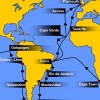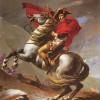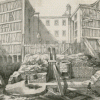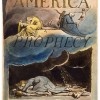
Siobhan Carroll, “On Erasmus Darwin’s The Botanic Garden, 1791-1792″
1792 witnessed the publication of the complete version of Erasmus Darwin’s The Botanic Garden, a lengthy nature poem that surveyed the state of science in its day. The Botanic Garden proved immensely popular on its publication but later fell out of favor as the Anti-Jacobin took aim at its liberal politics. This paper focuses on one of the most notorious sections of the poem, in which Darwin describes his plan to change the world’s climate via iceberg destruction. The argument traces the reception of Darwin’s climate imagery from its initial reception through its redeployment in the poetry of Percy Bysshe Shelley. Although The Botanic Garden and its plan for climate intervention might be framed in terms of what philosophers call the “negative event”—an event that fails to happen—Darwin was essentially correct in his assertion that the technologies of the industrial revolution could be used to change the climate of the globe.

Timothy Johns, “The 1820 Settlement Scheme to South Africa”
The 1820 settlement scheme to South Africa marks an important conjuncture both for the colony’s internal development and for the rhetoric of immigration in the internal politics of Britain. Examining the rationale for the venture in light of the seminal historical event of the age—the Peterloo Massacre of 16 August 1819—and in light of Romantic notions of the “Noble Savage,” this entry attempts to demonstrate how concerns surrounding the South African scheme came to be entangled within larger debates over joblessness, slavery, class struggle, and inanition in early nineteenth-century British culture. Limiting its focus to a reading of The Emigrant’s Cabin (1822, 1834), a poem by the settler-poet Thomas Pringle (1789-1834), the entry argues that 1820 settler rhetoric navigated debates over labor through a novel engagement with time. By imagining a two-tiered system of labor time in the poem—one for settlers, based on unemployment relief and freedom from the oppressive pace of industrial life; and one for the African labor force on the eastern Cape farms, based on missionary discipline, a proto-Victorian program of “improvement,” and freedom from slavery—Pringle’s verse helped foster a British cultural identity in the Cape that resonates even today.

Ian Duncan, “On Charles Darwin and the Voyage of the Beagle”
The event now known as “the voyage of the Beagle” comprises Charles Darwin’s circumnavigation as ship’s naturalist on the second of three surveying voyages by H.M.S. Beagle; the writings published as his first book, the Journal of Researches; and the genesis of his theory of evolution by natural selection. Writing between regimes of world-knowledge, Darwin mediates scientific observation through the language of aesthetics, and seeks to understand the convergence of disparate scales of geological and human history.

Mary Favret, “The Napoleonic Wars”
Trying to locate the Napoleonic Wars as an event, or a constellation of events in time and space, only reveals the historical dislocations produced by war on a global scale. Like many of the wars of the twentieth century, the Napoleonic wars illustrate how warfare, seemingly the most conventional object of history, defies history’s most conventional questions: when, where, who? Yet these particular wars also pose distinctive difficulties to our efforts to pin them down. This essay examines how the Napoleonic wars, in their scale, their repetitions and infiltration of cultural forms, keep history – and the historical event – an open, persistent question.

Anne Helmreich, “On the Opening of the Crystal Palace at Sydenham, 1854”
The Crystal Palace at Sydenham represents a number of key paradigms in Victorian culture: the emphasis upon visuality as a means of acquiring and conveying knowledge, the use of display as a vehicle of both education and entertainment, the desire to construct unifying historical narratives, and the emphasis upon rational recreation.

Virginia Zimmerman, “On Accidental Archaeology”
Archaeological excavations in the nineteenth century presented images of past and present collapsed together. Examining the accidental excavation of Roman remains in London and the failed excavation of Silbury Hill in Wiltshire, this essay shows how the intrusion of material from one time into another disrupted notions of linear chronology.

Diane Piccitto, “On 1793 and the Aftermath of the French Revolution”
In 1789, many British radicals interpreted the early events of the French Revolution in mythic terms, as signs that a cataclysmic event, akin to the Christian apocalypse (entailing the renovation of the fallen world), was at hand—and that, paradoxically, human beings rather than God were the agents of this absolute change. However, two major events in 1793 undermined the optimism of these readings: the regicide of Louis XVI and the start of the subsequent Reign of Terror. These disturbing events left many radicals questioning the viability of revolution and, more specifically, the efficacy of violence in producing fundamental and widespread change for the better. Using William Blake’s America as a case study, this article examines how the violence of 1793 not only complicated and ultimately terminated the possibility of interpreting the revolutionary events in France as a fulfillment of the grand biblical narrative of human regeneration but also placed in doubt the potential for human interventions in the historico-political realm to ever initiate this new world.

Martin Meisel, “On the Age of the Universe”
The Charles Darwin-inspired debate over the Age of the Earth that pitted contemporary Physics against the theory and practice of contemporary Geology was intimately tied to recent unsettling projections on the thermodynamic fate of the universe. The leading voices in the debate were William Thomson, later Lord Kelvin, and Thomas Henry Huxley, Darwin’s most able champion. The argument—resolved only in the next century—has exemplary value as an intractable dissonance between two vigorous and well established, but not entirely secure scientific disciplines. And its content laid some of the groundwork for the pessimism that qualified the cult of progress and the whiggish habits of cultural and material complacency towards the end of the century.
